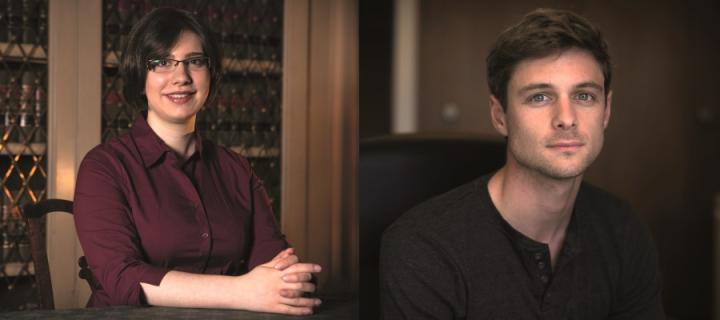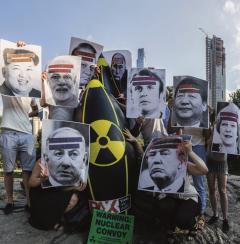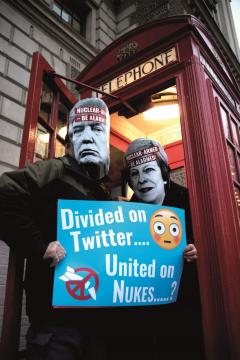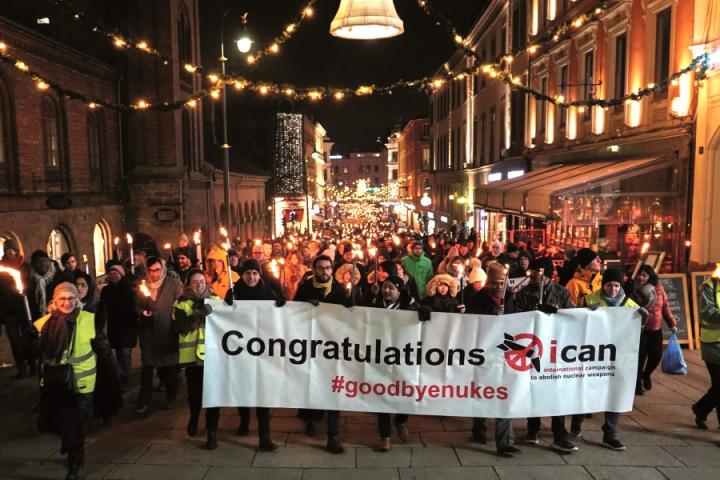From Old College to Oslo - The Edit interview
Graduate Daniel Högsta and PhD student Dagmar Topf Aguiar de Medeiros talk about their work with Nobel Peace Prize winners ICAN.

By Barbara Morgan
In 2017 the Nobel Peace Prize was awarded to ICAN, the International Campaign to Abolish Nuclear Weapons; the organisation where Daniel Högsta had spent the past five years, hard at work, after graduating from Edinburgh Law School in 2012. In the summer of 2016 Dagmar Topf Aguiar de Medeiros, currently pursuing her PhD at the Law School, also became fully engaged in ICAN’s mission, during her internship with the small, yet clearly very effective, Non-Governmental Organisation (NGO).
The Nobel committee awarded the Peace Prize to ICAN at a ceremony in Norway for ‘its work to draw attention to the catastrophic humanitarian consequences of any use of nuclear weapons and for its ground-breaking efforts to achieve a treaty-based prohibition of such weapons’. The United Nations Treaty on the Prohibition of Nuclear Weapons was passed on 7 July 2017. It is the first legally binding international agreement to comprehensively prohibit nuclear weapons. Its goal is their total elimination.
Here, in the Edit interview, we find out more about Daniel and Dagmar, and their incredible experiences in playing a part in this dramatic shift in international law.
BM: You’ve both been closely involved in the work of ICAN, and in turn, contributed directly to ICAN winning the Nobel Peace Prize. Can you tell Edit readers how you arrived at the decision to work for the organisation?
Daniel: I went through a bit of a crisis towards the end of my degree programme, knowing that practising law in Scotland didn’t feel right for me. So I applied for a bunch of internships and as I was walking out of my Property Law 2 exam, wondering what would become of me, I got a phone call from ICAN. My application had been passed to them by another organisation that I’d applied for. They liked my profile and threw me into their application pool. After a couple of interviews, I got the job! Crazy how it can work out like that.
Dagmar: When I first moved to Edinburgh I decided to join United Nations House Scotland as a research intern, because they provided me with the opportunity to get valuable experience working with NGOs and because it was a great way to meet people with shared interests. One of the first projects I got involved in was the organisation of a conference on Scotland’s position in relation to nuclear weapons. From this the opportunity arose to be a part of the Scottish delegation to the headquarters of the United Nations (UN) in New York to attend the negotiations of what is now the Treaty on the Prohibition of Nuclear Weapons. In New York I first got to experience working closely with ICAN.

BM: How important was it for you to be involved with that particular NGO, what chimed for you between ICAN’s purpose and your own personal ambitions?
Daniel: From the first day at ICAN I realised – from observing my colleagues, to reading the strategy and getting to know the board members – I’d landed somewhere really exciting. I started as an intern, not knowing how long I’d be able to stay. Three months? Six? But I just got stuck into the work and helped out where I could across all aspects of the organisation: advocacy, communications, administration, finance. My colleagues believed in me and after about a year, I became responsible for the coordination of our lobbying activities and for the coordination of ICAN’s partnership network (currently 468 partners in 101 countries).
Dagmar: I was very impressed by ICAN’s inclusiveness. Everyone was encouraged to contribute. The traditional discourse surrounding nuclear weapons has been one of fear, mistrust, and defensiveness. ICAN’s positive attitude and humanitarian focus were able to draw people into their reframed narrative and encouraged engagement with all and any actors. This inclusive approach is something I value very much and feel strongly about. I feel inspired to think of all the things that might be achieved if we can view people’s differences in terms of insights they can bring to the table, rather than as a cause for division.
BM: What have been the stand-out moments working on the campaign?
Daniel: By far the most exciting time for me at ICAN was the process of negotiations at the UN. Our role was to ensure the resultant treaty was as good as it could be, which meant a lot of co-ordinated lobbying work. We’d worked for five years to prepare the ground for the negotiations. It was such a buzz to be able to see the treaty become a reality after all that time.
Dagmar: Yes, having the opportunity to work in that environment and connect with so many NGOs from around the world was definitely a stand-out moment.
BM: Daniel, can you tell us how it felt to attend the Nobel Peace Prize ceremony and be taking part in such a high-profile global event?
The whole process of preparing for Oslo was definitely a nerve-racking but really exciting experience. Our work had largely been in the UN sphere previously, so the Nobel weekend felt like we were introducing ourselves to the world. We received some pointers from the Nobel Committee, they were really supportive and they totally got us, which was amazing. How did they manage to learn so much about us before the announcement without us knowing? It was really impressive.
I was actually nervous the whole weekend. But as soon as I heard my boss, Beatrice Fihn, utter the first couple of sentences of her speech, I knew that she was going to own it. And she did! The rest of the time was a blur, but obviously meeting the singer John Legend and dining with the King and Queen of Norway stick out in my mind.
BM: Going back in time, can you recall what inspired you to study law in the first place?
Dagmar: I decided I wanted to study law when I was 15 and was choosing my subjects for A level. I was interested in studying law because of my international background. I have three nationalities (American, German, Portuguese) and growing up I lived in the US, Germany, the Netherlands and England. Every time I moved, I would observe and adapt to my environment. This made me very curious about the structures, rules and machineries of different societies. Studying law seemed like a great place to start looking for answers.
Daniel: While I wasn’t sure about actually going into legal practice, I felt that studying law would give me several options. My initial thought was to go into the humanitarian field with an institution like the Red Cross or one of the UN agencies, with a view to doing fieldwork, and I’d learned that a law degree and the skills you learn in studying law would be useful across a range of careers.

BM: And why Edinburgh?
Daniel: I had spent a year abroad at the University of St Andrews during my undergraduate studies, so I was already drawn to living and studying in Scotland and I was obviously very attracted to the idea of studying law at Edinburgh, given its standing.
Dagmar: Aside from a two-day trip to Edinburgh with some friends in 2013, I had never been in Scotland before. I did my undergraduate and masters degrees in the Netherlands. For my PhD, Edinburgh was my university of choice. While preparing my research proposal for the PhD, I read many publications by members of the Law School, so – while I had also been accepted elsewhere – I was incredibly pleased when I received my offer from Edinburgh.
Dagmar, your PhD will be allencompassing right now, but what are you starting to think about for post-publication of your thesis?
At the moment I am still spoilt for choice! In addition to the research and writing I do for my thesis, I am also employed by the University as a tutor. I enjoy teaching because of the interaction I get with the students. In addition, I also have two research assistant jobs and I greatly enjoy the combination of practical work and being able to use my legal knowledge and research skills. In my free time I continue to be involved with various NGOs in Scotland. While I’ve not yet decided on exactly what type of job I want, I do know that I would like it to be something that involves research, social engagement and interaction.
Daniel, you graduated some years ago of course. Can you tell us about any favourite memories of your time at Edinburgh?
I have to give a special acknowledgement to Professor James Harrison who was one of the professors on my Public International Law course. I doubt he remembers me, but I remember asking him for advice in the stairwell leading up to the library in Old College. I asked him what to do if I wanted to pursue a career related to international law and he said that I should try to get an internship in a small NGO where I could get stuck into the day-to-day work and see how civil society operates. Interns at small organisations tend to be given a lot more responsibility than they are at an institution like the UN, where there is really high turnover. He mentioned that he had done something similar while he was in his early 20s. That stuck with me and was basically the reason I started to apply for various internships in Geneva after I graduated. I hope I get to thank him in person one day.
BM: What has the Prize meant for ICAN since the news hit in late 2017?
Daniel: It’s a massive boost for ICAN’s work, but more importantly it’s a boost for the Treaty and the concept of the humanitarian-based approach to disarmament. Nuclear disarmament has been in a moribund state for decades. The motivation behind ICAN’s work was the belief that a treaty which categorically prohibited nuclear weapons would create a new norm in international law, which would stigmatise nuclear weapons in a way that they hadn’t been before. And – crucially – that it was possible to pursue even if, as expected, all the nuclear weapon states boycotted it. Indeed, that was almost precisely the point: they’re not interested in giving up their weapons, so why should we let them determine the pace of progress?
In past processes we’ve seen that prohibition typically precedes elimination. The Nobel Peace Prize just elevates everything that we’re trying to do immeasurably. It’s a huge honour and also an incredibly exciting boost. Dagmar: I noticed that before the award, I would often be asked whether I didn’t think it was dangerous or futile to attempt nuclear disarmament (dangerous because the old narrative spread the misconception that we need nuclear weapons to keep us safe, futile because our campaign efforts were utopian). After news spread of the Prize, this perception changed, nuclear disarmament began to be perceived as more realistic and increasingly desirable.
BM: And how have things changed for you personally?
Dagmar: I still try to engage people on the topic of nuclear disarmament – when the context is relevant! Also, I wear my ICAN pin badge with a lot of pride, which I guess is a non-verbal communication of my involvement with ICAN.
Daniel: I’ve always found it awkward to say to people that I work in nuclear disarmament because one tends to get somewhat quizzical looks. Obviously, being part of the gang that won the Nobel Peace Prize was a totally mad thing. It feels strange though – I really try not to mention it. My mother has already seemingly blanketed social media with her own promotion efforts. Ha! Ha!

BM: You’ve both achieved so much already. What do you want to do next?
Dagmar: The next step is to continue to raise awareness of the Treaty and the next big challenge is to ensure it enters into force. After that, implementation of the framework and further development of regulations need to be tackled. In Scotland in particular we face some interesting challenges. While Scotland’s First Minister Nicola Sturgeon backed the Treaty, Scotland is not in a position to sign and ratify it, as only Westminster can do this.
Daniel: Well for ICAN it’s really just the start. We have the Treaty which we worked so hard to achieve and now we have the incomparable boost of legitimacy, credibility and excitement conferred by the Nobel Prize. But we haven’t even come close to achieving what we need to. The purpose of the Treaty was to change the way that nuclear disarmament operates and to create new opportunities for campaigning in all national contexts. This is going to be a whole new phase for us and I’m excited for that to begin.
If you would like to discover more about ICAN’s work towards nuclear disarmament, visit:
Barbara Morgan graduated from Edinburgh Law School in 1998, and following a decade in higher education publishing, she is currently Head of Publishing & Communications at the University of Edinburgh.

